The nuclear dimension to UK election
- Published
- comments
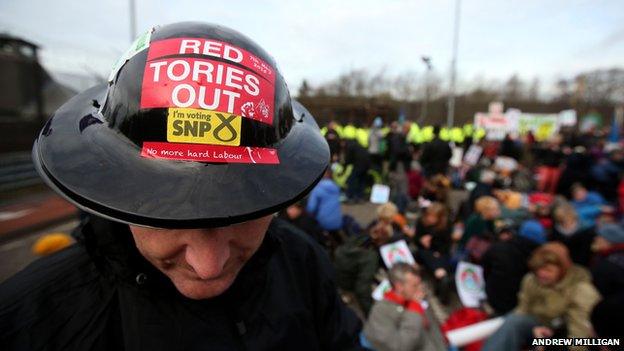
SNP-supporter at the British naval base in Faslane at an anti-nuclear protest in April
The British naval base in Faslane, Scotland, is home to four Vanguard submarines - and the source of a fierce debate that illustrates the sticky political issues presented by the rise of the Scottish National Party in this year's general election.
While it may be hard for most Americans to imagine, those four submarines, equipped with ballistic missiles, are the sum total of the UK's atomic arsenal. While the US has ICBMs, bombers and submarines of their own, the British nuclear weapons programme is solely contained in the dark, sleek vessels that slip in and out of Faslane.
It's become a common Conservative Party talking point in these last days of the campaign that the only way the Labour Party can return to power is by striking a deal with the SNP. Although it's a charge Labour vehemently denies, the SNP will likely post major wins at Labour's expense in Scotland's 59 parliamentary seats. If that happens, one of the bargaining chips in any deal could become the Faslane submarines and their Trident nuclear missile systems.
The SNP wants the submarines gone not just from Scottish waters, but decommissioned entirely.
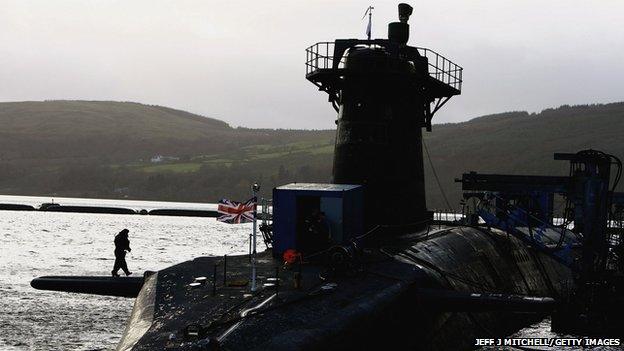
HMS Vanguard sits in dock at Faslane Submarine base on the river Clyde in Scotland in 2006
"Trident is utterly irrelevant to the defence and security challenges we face in the 21st century," SNP defence spokesperson Angus Robertson said last month, external.
SNP leader Nicola Sturgeon has called defunding the Trident programme a non-negotiable "blood red line" and, in a Scottish leaders debate in Edinburgh Sunday night, refused to rule out voting down a Labour budget that includes maintaining the missiles.
Complicating all this is the fact the nuclear missile programme is aging - and will require additional moneys to stay operational. Coming on the heels of steep austerity cuts imposed after the 2008 recession, the estimated investment of at least £17.5bn is proving a bitter pill for many to swallow.
Labour leader Ed Miliband has said he wants to keep the UK a nuclear power, but he hasn't ruled out reducing the number of submarines.
And so the Conservatives have pounced on Mr Miliband, whom they charge with threatening to forsake the protection provided by a nuclear deterrent.
"If he wants the keys to Number 10, he must abandon any plans to renew our current Vanguard ballistic missile submarines," said Defence Secretary Michael Fallon.
He added that Mr Miliband "is willing to stab the United Kingdom in the back to become prime minister", comparing it to a Labour leadership fight Mr Miliband had with his brother.
Mr Miliband replied that Mr Fallon had "demeaned himself and demeaned his office".
Former London Mayor Ken Livingstone tweeted, external: "We should stick pompous Michael Fallon on the end of a nuclear missile and fire it off into space."
This kind of back-and-forth prompted UK Independence Party leader Nigel Farage, who supports continued nuclear funding, to quip that the campaign "is turning into an American, negative, shouting match between two parties". (Around here, comparing anything to US-style politics is sharp criticism indeed.)
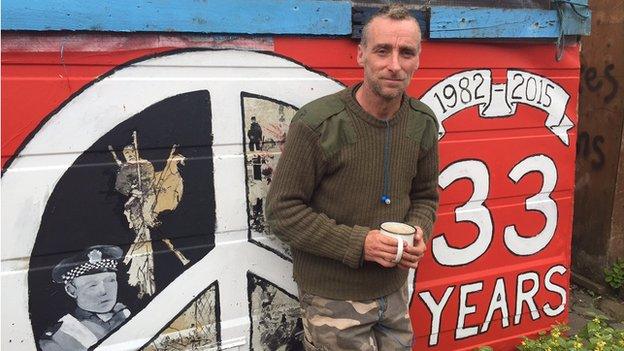
Chris Higgins is a resident of the Faslane Peace Camp set up to protest the British 'military-industrial complex'
All of this is just "stale Westminster politics" and the bickering of "grey men in grey suits", says Chris Higgins.
Higgins has a particularly unique view of the nuclear issue, as the Faslane navy base and its submarines are his neighbours. Since September, he's been a resident of the Faslane Peace Camp, a brightly coloured collection of caravans, trailers and hand-constructed shelters that has been a permanent fixture just down the road from the base for more than 33 years.
On a grey, drizzling afternoon in Faslane, I sit in one of these ramshackle buildings and talk with Higgins and his fellow camp residents about weapons, politics and nationalism.
They say they are vehemently opposed to nuclear arms and maintain their site, which draws visitors from around the world, as a protest against the British "military-industrial complex". On 13 April they staged a rally to blockade access to the base that drew hundreds of protestors to the area.
At one point Higgins reaches into his pocket and pulls out a small piece of thick metal wires, soldered together. It's part of the Faslane base's fence, which he and some friends cut through during one of their attempts to sneak onto the base to highlight its security weaknesses.
Is he afraid he's going to get shot?
He says he always raises his hands and shouts "I'm unarmed!" when spotted. Once, he says, a guard was disciplined for falling asleep and not noticing their intrusion.
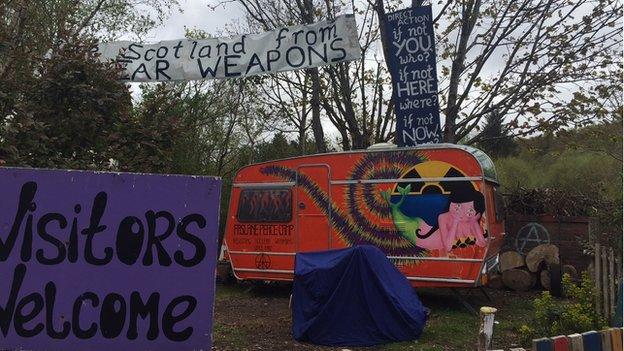
Peace Camp near Faslane is over 30 years old and attracts visitors from around the world
It's perhaps an indication of just how quickly the political climate is changing in Scotland. With the rise of the SNP, the campers can sense that after three decades they may be inching closer to a time when such acts of daring - or foolishness, some might say - are no longer necessary.
"I think they have a strong anti-nuclear agenda," Angus Chalmers, a camp activist from Edinburgh, says of the SNP. "They have a strong resolve for getting rid of nuclear weapons, and it's a good opportunity."
The situation has Dave Stevens, who's lived in the camp for 10 years, puzzled. He says most of the peace activists aren't big on nationalism, Scottish or otherwise, but they find themselves standing with the SNP.
"It's actually kind of a strange situation to be in because usually, when you have a campaign and you're trying to change the world, you're trying to convince the government of this also," he says. "This time, we're on the same side as the Scottish government."
He adds that he's hopeful that a breakthrough is near, "but I've seen political opportunities come and go".
"New Clear Free Scotland" reads this gate to Peace Camp. For once, protestors say, voices in government are on their side
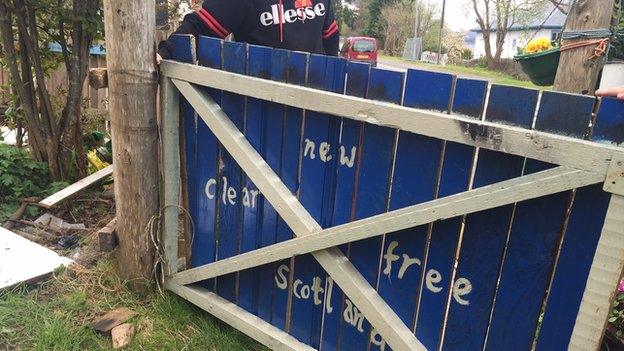
'New Clear Free Scotland' says this gate at Peace Camp. For once, protestors say, the government is on their side
The SNP has a plan to use its strength as a voting bloc in a fractured Parliament after Thursday's election to finally take aim at the nuclear subs.
"No sensible UK government would develop a nuclear weapons capability now if one didn't exist," SNP's Robertson said, sounding a lot like one of the Faslane peace activists. "Therefore, a strong group of SNP MPs in a hung parliament, working with other progressive political forces, can bring common sense to bear now - and halt Trident renewal in its tracks."
As Scottish poet Robert Burns once famously wrote, however: "The best laid schemes o' mice an' men, gang aft agley".
Or, as Americans much less eloquently put it: "Don't count your chickens before they've hatched."